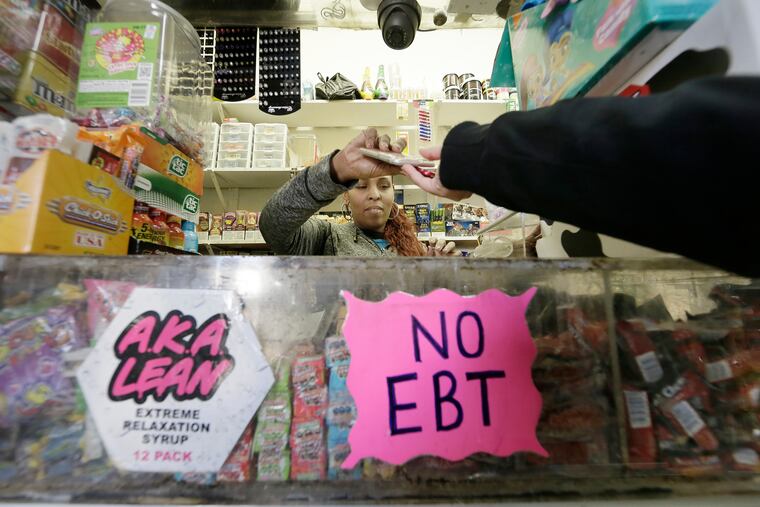Kensington High’s cell-phone ban: What readers and the principal had to say after my last column | Ronnie Polaneczky
Readers sound off about the controversial policy, which has some students storing their phones - for a fee - at some corner stores.

Two weeks ago, I solicited advice from readers and educators about how Kensington High School might resolve a student dilemma related to its ban of cell-phone possession in the school.
Kids can’t even keep them in their lockers. So students who need their phones before and after school have had to find places to store them in the neighborhood. Some hide them under bushes or inside burned-out cars. Others stash them at corner stores, at least one of which charges a fee for the service.
I found the situation bizarre. My heart went out to kids who couldn’t leave their phones at home because they relied on them to feel safe as they hightailed it through Kensington’s sketchy blocks.
But the kids' dilemma was not unique, a reader told me.
“Check out what happened in New York,” he said.
When the city’s Department of Education instituted a ban on student-phone possession in schools, in 2006, a veritable cottage industry of phone-storage operations blossomed. Corner-store owners charged fees and roving-phone-storage vans roamed the boroughs, collecting kids’ phones for the school day.
Leave it to New York to go pro, right?
The Education Department’s aim was to keep kids calm and focused in class. But the result was actually inequity, because the ban was enforced mostly at schools with metal detectors, which are overwhelmingly located in low-income communities.
The ban was lifted in 2015, tanking the cottage industry it had created.
Many other readers, including current and retired educators, flooded my inbox with different versions of the same four suggestions for Kensington High’s principal, Dr. Jose Lebron:
Make the kids sign a contract promising to keep their phones in their lockers all day - and have parents sign a contract of their own promising to hold their kids accountable. If students break the contract, their phones would be confiscated, and they’d get them back only after their parents came to the school to retrieve them.
Have teachers collect the phones at the beginning of class and return them at the end. This way the kids wouldn’t be using them to watch YouTube videos when they should be learning the Periodic Table.
Have administrators hang onto the kids' phones in the main office and return them at the end of the day.
Install a phone-storage system at Kensington like the magnetic kind currently used at the Criminal Justice Center, in which phones are placed in magnetically sealed pouches and returned to visitors. The seal is broken (think retail check-out systems) when visitors leave.
Last week, I was finally able to discuss the situation with Principal Lebron, who hadn’t responded to prior calls for comment.
First things first: Lebron is a good man who has done much in the last three years to keep students safe in the building.
He appointed three staffers to calm the school’s behavioral climate. They’ve painstakingly built trusting relationships with students and families. Daily “town halls” with all grades keep communication open between staff and students, so problems can be addressed before anything escalates to a crisis. And administrators patrol the neighborhood before and after school to keep eyeballs on the street. If an issue arises, Lebron speed-dials the local police captain, whose officers have been responsive and professional.
All of this is in service of a secure culture conducive to learning.
“Student safety is our first concern,” says Lebron. “Parents and the students themselves tell us how much they appreciate it.”
Which is why Lebron won’t allow cell phones anywhere inside the school at any time.
Before the ban, students used them to send bullying texts to each other, he said. To plan brawls. To inflame feuds and then summon family members to the school to carry out retribution.
“We’ve tried cell-phone policies from A to Z,” Lebron says, such as demanding that phones be kept in lockers or backpacks, only to have the mandatory directives ignored. “The only thing that has worked is a complete ban. The school is calmer, and the students are more focused.”
A year or so ago, students proposed installing a phone-storage system in the administration office, but the school’s already stretched-thin staff would have been required to monitor it. The system also would have been created mayhem before and after school as hundreds of students would descend for drop-off or pick-up.
As for magnetic-locking pouch systems, the cost is simply prohibitive.
Then there’s the liability issue.
“Phones are expensive,” says Lebron. “We can’t be responsible for them getting broken or stolen.”
The more Lebron spoke, the more I understood his complicated reasons for banning students' access to their phones in the first place – and why readers’ suggestions probably wouldn’t work at Kensington High. Too many kids would still find ways to use them to cause a whole lot of trouble.
Which is still not fair to the good kids, which Kensington has plenty of.
There are no easy answers – not yet, anyway. But I’m all ears if you have more ideas that might work for everyone. To keep the conversation going, reach out to me at polaner@phillynews.com.